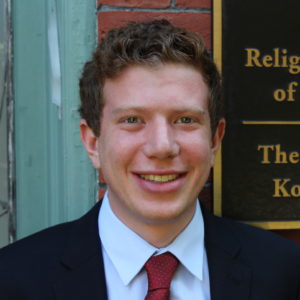
Faith in Medicare for All
by Fran Quigley
Photo by stevepb on Pixabay (CCO)
For Dr. Will Cooke, an evangelical Christian physician in rural Indiana, the Sermon on the Mount motivates him to care for his poor and often addicted patients, and to raise his voice to advocate for better access to treatment and medicines. “Just praying for the sick or yielding the responsibility for those in need to the church or the government does not fulfill our personal responsibility to advocate,” he said. “We can’t do everything ourselves individually, but if we each act individually every day, collectively we can do something very significant.”
Dr. Cooke shared these views on the U.S. healthcare crisis with our weekly publication Faith in Healthcare. Interviews with others of different faiths echoed his conclusion. “There is a verse in the Holy Qur’an that if you save one life, it is as if you have saved all of humanity,” Arshia Wajid told us.
“All faiths have similar sayings where human beings are prompted to fight for social justice and help their fellow brethren,” she said. “Providing access to affordable health coverage is a mandate for people of faith and one of the most important ways of preserving life.” So Wajid and others founded American Muslim Health Professionals, which includes among its tasks building a network among the 70-plus Muslim-led free health clinics across the U.S.

Rabbi Michael Knopf of Congregation Beth-El in Richmond, Virginia, told us that he found the same responsibility embedded in the Torah and rabbinical literature. “My understanding of the Jewish tradition is that healthcare is a human right, and that people have a right to as much healthcare as they need to thrive,” he said. And it is a right that we are all responsible for fulfilling: “Jewish law is clear that healthcare is a communal obligation.”
These and other U.S. advocates and leaders agree that the faith community can take justifiable pride in providing generous direct charity health care in the form of faith-affiliated clinics and hospitals But they also agree with Rabbi Knopf’s observation of a communal obligation that is triggered when even our best charitable efforts leave enormous gaps in coverage. And, they say, scripture and tradition both prove it.
Scripture and Healthcare
Across all major faith traditions, the mandate to ensure healthcare for all is a strong one. There are dozens of New Testament references to Jesus performing acts of healing, so many that he was often referred to in the early church as “The Great Physician.” Jewish scripture includes health care mandates throughout, including in Proverbs 31:9, Isaiah 1:17 and Deuteronomy 15:11 (“You shall open wide your hand to your brother, to the needy, and to the poor.”) History’s first structured charity hospitals were built by Islamic communities, fulfilling that faith’s zakat pillar’s unequivocal command to care for the needs of the poor. The Buddhist, Taoist, and Confucian traditions are replete with similar health care examples dating back as far as 400 B.C.
There is strong precedent for interfaith healthcare advocacy as well. In response to the 2017 efforts to repeal the Affordable Care Act, faith groups raised their collective voice, and to great effect. Dozens of denominations and organizations from a wide range of faith traditions issued joint statements, mobilized their congregations, and conducted a dramatic Capitol Hill vigil. As a March 2017 letter signed by leaders of 40 faith organizations said, “The scriptures of the Abrahamic traditions of Christians, Jews, and Muslims, as well as the sacred teachings of other faiths, understand that addressing the general welfare of the nation includes giving particular attention to people experiencing poverty or sickness.”

That interfaith advocacy was led in part by Nathan Bennett of the Religious Action Center of Reform Judaism. “In the ACA repeal fight, we were able to connect the dots between personal, community-based service by persons of faith and the advocacy needed to defend the healthcare coverage that so many people rely upon when they are sick,“ he said. ““Across all faiths, none of us are taught to believe that some people deserve healthcare and others do not. We are taught to believe that all people are created in God’s image. When we express those shared moral beliefs, and when we bring our own personal experiences of direct service, people of faith can be extremely impactful in larger policy debates.”
The Current Challenge
The attempt to repeal the ACA was rebuffed, but a massive U.S. healthcare challenge remains. Our sisters and brothers with diabetes, high blood pressure, and asthma end up in the emergency room—or worse—because they can not afford medicines and care. One in four Americans who need insulin are rationing it due to cost. Nearly half of working Americans have insurance with such high deductibles that they have to pay for care and medicines out of pocket—or go without.
Unique among high-income countries, the U.S. generates billions of dollars each year for for-profit health insurance companies and monopoly-protected pharmaceutical corporations. The resulting injustice and inefficiencies have made us the globe’s most notorious underachiever in health care. Among comparable nations, we consistently pay the most for our care while enduring worse outcomes.
Let’s be clear about the real-world meaning of the phrase “worse outcomes:” every year, tens of thousands of Americans die preventable deaths due to the lack of adequate health insurance. Millions more suffer needlessly from grinding pain and disability.
This is a state of affairs that cannot be reconciled with our faith mandates.
With health care needs often being quite complex and difficult for patients to understand, much less negotiate for cheaper care, even many political conservatives concede that a market-driven approach is a poor fit for meeting the needs of the sick and the struggling. The same is true for our societal challenges of ensuring public safety, a functioning infrastructure, and protection of our legal rights. We meet those challenges with communal systems, where our government acts in our names and is accountable to us all. With health care, we can and must do the same.
As Pope Francis has said, life-essential care and medicines should not be treated as a commodity to be leveraged for maximum corporate profits. “Health is not a consumer good, but a universal right,” Francis said in 2016. “So access to health care services cannot be a privilege.”
There is a proven model for achieving that type of morally just health care system, a compassionate alternative to the cobbled-together, profit-oriented mess that we endure now in the U.S. That model is a single-payer health care system. As faith community advocates for single-payer have pointed out, the approach is simple and efficient. Its hallmark feature is a guarantee that all U.S. residents are covered from birth to death for all of our health needs, from doctor visits to prescription medicines to dental and vision care.
The term single-payer refers to the government being the responsible party for health care bills, as is the case now in countries like Canada and Taiwan. It is also the foundation for the core components of our own Medicare system. Under single-payer, coverage is no longer tied to the fine print in private insurance policies or the whims of employment. Premiums, co-payments, and deductibles disappear.
That may sound like a utopia, but universal coverage and low-cost care is the norm for other countries with the resources the U.S. enjoys. Their experiences prove that we can provide better care thanks to the hundreds of billions of savings gained by bypassing the bloated administrative costs associated with for-profit claims processing, billing and marketing. Further savings come from using single-payer bulk purchasing power to negotiate down the skyrocketing costs of prescription drugs, as other nations do quite successfully.
Faith Communities and Medicare for All
Unsurprisingly, there are well-funded for-profit forces determined to resist efforts to change a healthcare system that enriches them. It will take a movement to overcome those efforts, and the history of successful movements tells us that people across multiple faith traditions are destined to play a role in responding to this crisis.
One of those movements responded effectively to the same challenge we face today. Tommy Douglas, the former premier of the Canadian province of Saskatchewan, is known as the father of his country’s single-payer system, created in response to the crisis in access to care after World War II. Less well known is that Douglas’ pre-politics background was as a Baptist minister in the social Gospel tradition. “We don’t step out front door into kingdom of God,” he said. “Instead, we slowly and painfully change society until it has more of the values that emanate from the teachings of Jesus or from other great religious leaders.”
Buoyed by significant faith community support, Douglas pushed through a system that has led to a generations of Canadians growing up not knowing what it is like to worry about paying a medical bill, and which obtains universal coverage at about half the cost of our patchwork U.S. system. A whopping 94 percent of Canadians report taking national pride in the success of their health care system, and Tommy Douglas has been voted the “Greatest Canadian” for his efforts. As one faith community advocate in Canada called it, their UHC system is “the Good Samaritan writ large.” And the faith community helped make it happen.
The time is ripe for the U.S. to finally follow the lead of Canada and the other developed countries that treat healthcare as a human right. Medicare for All legislation has nearly 120 co-sponsors in the U.S. House of Representatives and support from a growing number of senators, reflecting polls that show a majority of Americans support a single-payer system. Frustrated by the hours they spend every day on private insurance paperwork, a majority of U.S. physicians now support a single-payer system. So do many business leaders, who struggle with ever-increasing insurance costs for their employees. Warren Buffett calls the U.S. health care system the tapeworm of U.S. competitiveness, which is why he supports a single-payer alternative.
But the will of the people does not always translate into changed policies, especially when heavily-financed lobbyists and campaign contributors from insurance and pharmaceutical companies block the path. That is where the faith community comes in. The economic argument in favor of a single-payer, universal health care system is undeniably powerful, but the moral case for health care as a human right is even stronger. The faith community stands in the ideal place to advance that moral argument.
People of faith, acting individually and in concert with their congregations, denominations and other organizations, played central roles in the great human rights movements of the modern era. Faith community action was central to the success of the U.S. civil rights movement, the anti-apartheid movement, and the slavery abolition movement. And we can make change happen again.
That is especially true in the context of health care, where generations of “walking the walk” in providing direct care endows the faith community with well-deserved moral authority on this issue. We all have unequivocal scriptural and traditional mandates to ensure healthcare for all. It is time to fulfill them.

Fran Quigley is the editor of the weekly Faith in Healthcare, and is director of the Health and Human Rights Clinic at Indiana University McKinney School of Law.
Recommended Citation
Quigley, Fran. “Faith in Medicare for All.” Canopy Forum, December 2, 2019. https://canopyforum.org/2019/12/02/faith-in-medicare-for-all-by-fran-quigley/

